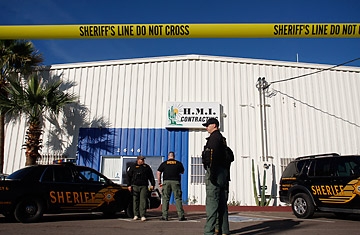
Officers stand outside the office of a contractor suspected of employing illegal immigrants. The Obama Administration has increased audits of employers suspected of using undocumented workers
In the fall of 2007, federal agents raided 11 McDonald's restaurants in the Reno, Nev., area, rounding up 56 employees on suspicion of working in the country illegally. A couple of weeks later, Barack Obama, then a long-shot candidate for President stumping through Nevada, was asked about the Bush Administration's policy of sporadic workplace immigration raids.
The candidate was unimpressed. "We are not going to solve the problem of 12 million immigrants here 50 immigrants at a time," Obama said that October. "I think this is much more for show than having a practical effect. We need comprehensive immigration reform."
Two years later, that need is still unaddressed, and it's Obama's Administration that is the target of criticism. President Obama has eliminated the regular workplace roundups of illegal immigrants, but the crackdown on their employers has, by contrast, increased. In November, the Immigration and Customs Enforcement agency (ICE) announced 1,000 new audits of employers suspected of employing illegal immigrants. This followed a July announcement of audits of 654 companies, which included reviews of more than 85,000 employee records and the discovery of more than 14,000 suspect documents. As a result of the crackdown, thousands of undocumented workers were fired from their jobs.
"On the enforcement side, we are really stepping up our efforts to audit employers, to investigate employers for knowing violations, to fine them and to prosecute them when appropriate," says John Morton, Obama's choice as director of ICE. "We are doing it on a much larger scale than it was done before."
According to government records, 1,897 workplace enforcement cases were initiated from April 30 to Nov. 19 of 2009, compared with 605 cases during the same period a year earlier under the Bush Administration. In Los Angeles, the designer-clothing company American Apparel fired about 1,800 employees in September following an ICE audit of employee records. In Minneapolis and St. Paul, Minn., the contract company ABM fired about 1,200 unionized janitors after a similar investigation.
The scope of the crackdown has raised objections from many of Obama's labor- and civil-rights supporters, who are demanding a more targeted enforcement effort focused on employers that provide poor working conditions or substandard wages. "These seemingly arbitrary audits represent a version of the flawed thinking that went into the Bush Administration's work-site raids," wrote Service Employees International Union president Andy Stern in a Dec. 11 letter to Homeland Security Secretary Janet Napolitano. "Forcing the dismissal of such a tiny percentage of the hardworking men and women who work long days mopping floors, sewing our clothes or handling meat on a factory line does not make us any stronger as a nation."
Morton says the ICE audits, which involve individual checks of employee-citizenship documentation, are intentionally broad and part of an effort to get companies to self-regulate. At the same time, the Department of Homeland Security has been marketing the voluntary use of the E-Verify program, an Internet-based system that allows employers to check the citizenship status of new hires. "We have to enforce the law, and the law isn't restricted to people who employ unlawful labor and have abusive working conditions," says Morton. "The law is that employers must hire people with work authorization."
The crackdown helps set the stage for a major legislative push for immigration reform in 2010, an effort that is supported by unions and the Department of Homeland Security. In a speech at the liberal Center for American Progress in November, Napolitano argued that the stronger enforcement efforts, combined with a more robust border-protection effort in the past year, set the stage for the passage of reform, which would provide a path to citizenship for many of the 12 million illegal immigrants in America. "Over the past year, as this Administration has pursued more effective strategies within the current laws, the picture of how exactly those laws need to be changed has become clearer than ever before," Napolitano said. "If we are truly going to fix a broken system, Congress will have to act."
Both Democratic and Republican strategists express hope and concern about a battle over immigration reform this year, which could yield legislation for the President to sign as soon as the summer. For Republicans, the concern is that a divisive battle could motivate Hispanic turnout for Democrats in the 2010 midterm elections. For Democrats, the concern is that independent voters, who are deeply concerned about high unemployment and a still sluggish economy, will see a major fight over citizenship for undocumented immigrants as an unwelcome distraction from other priorities. Democrats have already introduced an immigration bill in the House, and one is expected in the Senate early next year.
Groups opposed to Obama's immigration-reform effort have taken little solace in the stepped-up enforcement efforts, in part because the Obama Administration is not aggressively seeking to deport those workers who are fired for fraudulent paperwork. "Effective enforcement is pretty much past tense," says Bob Dane, a spokesman for the Federation for American Immigration Reform, a conservative group that opposes giving current undocumented residents a path to legalization. "The illegal workers are clearly allowed to remain in the country."
That said, few doubt that Obama will have an easier time selling the idea of reform that legalizes current undocumented immigrants if he can argue that the reforms would be accompanied by serious enforcement, something that never happened after the last legalization effort. "We know that one-sided reform, as we saw in 1986, cannot succeed," Napolitano said in November. "During that reform effort, the enforcement part of the equation was promised, but it didn't materialize."
All this suggests that 2010 is sure to see even more crackdowns on employers around the country for employing undocumented workers. The President who once dismissed immigration enforcement "for show" is now clearly trying to make a show of his own enforcement chops.
